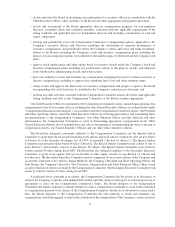SanDisk 2007 Annual Report Download - page 21
Download and view the complete annual report
Please find page 21 of the 2007 SanDisk annual report below. You can navigate through the pages in the report by either clicking on the pages listed below, or by using the keyword search tool below to find specific information within the annual report.The proposal takes the position that only one director election standard should be used by all U.S. companies.
However, this approach does not take into consideration the unique attributes of the Company’s cumulative voting
provision or our strong corporate governance structure and practices. Under the current standard for electing
directors, our stockholders have consistently and overwhelmingly elected a board comprised of highly qualified
directors from diverse backgrounds. These directors, and the management team selected by them, have delivered
solid financial performance and stockholder value. The Board of Directors does not believe the proponent’s
proposal could improve such performance.
The Potential Uncertainty of a Simple Majority Voting Standard
Under Delaware law, an incumbent director who is not re-elected “holds over” and continues to serve with the
same voting rights and powers until his or her successor is elected and qualified. While this critical aspect of sound
corporate governance practice is noted in the proponent’s supporting statement, the proposed majority voting
standard fails to address the director “hold over” issue. Therefore, even if the proposal were adopted, the Company
could not force a director who failed to receive a majority vote to leave the Board of Directors until his or her
successor is elected at a subsequent stockholder meeting.
Moreover, the proposal fails to address vacancies on the Board of Directors that would arise if a director who fails to
receive a majority of the votes cast chooses to resign his or her position. Delaware law and the Company’s Bylaws permit
the Board of Directors to elect a director to fill the vacancy, let the position remain vacant, or call another meeting of
stockholders for the sole purpose of filling the vacancy. In any case, the Board may be left with vacancies for an indefinite
period of time, making it difficult to staff key committees and otherwise meet its obligation to oversee the business and
affairs of the Company. This could cause additional uncertainty, disruption, and expense for the Company.
A Task Force of the American Bar Association Committee on Corporate Law studied the benefits and
detriments associated with a majority vote standard for the election of directors, and decided not to recommend a
majority voting standard for directors, stating:
“The Committee believes that it is not advisable to alter the existing plurality default rule. Although the
Committee is mindful of the criticisms of plurality voting, the Committee is currently persuaded that the
potential negative consequences of failed elections, combined with the uncertainty of applying an untested
voting standard as the default rule for public corporations, warrants the retention of the plurality voting rule.”
The Company’s Corporate Governance Practices
The Company’s corporate governance practices, including cumulative voting, have been recognized by
RiskMetrics (formerly Institutional Shareholder Services), which has ranked the Company ahead of its peer
companies in the technology hardware and equipment group, as measured by the RiskMetrics Corporate Gov-
ernance Quotient. These corporate governance practices are designed to identify and propose director nominees
who will best serve the interests of the Company and its stockholders. The Board of Directors maintains a
Nominating and Governance Committee that is composed entirely of independent directors. The Nominating and
Governance Committee applies a robust set of criteria in identifying director nominees and has established
procedures to consider and evaluate persons recommended by stockholders, described in detail elsewhere in the
proxy statement under the heading “Consideration of Director Nominees.”
The Company’s stockholders have consistently elected highly qualified directors, substantially all of whom,
other than the Company’s Chief Executive Officer, have been “independent” within standards adopted by The
NASDAQ Global Select Market. In the past, every director nominee has received the affirmative vote of a strong
majority of the shares voted.
Required Vote
The affirmative vote of a majority of the shares present in person or represented by proxy at the Annual
Meeting and entitled to vote on Proposal No. 3 is required to approve the stockholder proposal regarding majority
voting for Directors of the Company
Recommendation of the Board of Directors
For the reasons set forth above, the Board believes that Proposal No. 3 is not in the Company’s best
interests or the best interests of its stockholders and recommends a vote AGAINST Proposal No. 3.
18
























